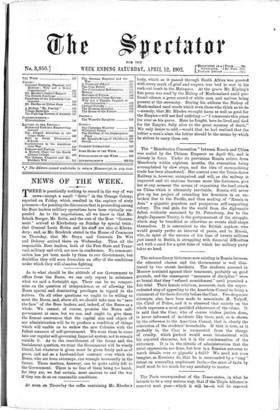The extraordinary bitterness now existing in Russia between the educated
classes and the Government is well illus- trated by two recent incidents. The students arrested in Moscow mutinied against their treatment, probably on good grounds, and the consequent "measures of discipline" were so brutal that they "refused nourishment" until promised a fair trial. Their female relatives, moreover, took the unpre- cedented step of appealing to the American Consul to bring a statement of the facts directly before the Czar. Two desperate attempts, also, have been made to assassinate M. Trepoff, the Chief of Police, and it is observed that society on the whole expresses a most qualified abhorrence of the crime. It is said that the Czar, who of course wishes justice done, is never informed of incidents like these, and, as is shown by the reference to the American Consul, that is clearly the conviction of the students' households. If that is true, as it probably is, the Czar is exonerated from the charge of cruelty, which 'indeed would seem inconsistent with his reported character, but it is the condemnation of the autocracy. It is in the ',details of administration that the great oppressions are done, but how is a Russian autocrat to watch details over so gigantic a field? We need not even imagine, as Russians do, that he is surrounded by a " ring " intent on concealing unpleasant facts,—the mass of facts by itself must be too much for any assiduity to master.










































